
[embedded content]
It’s been almost three years since the episodic adventure series Life is Strange wrapped up on PC and console, and seven months since it debuted on iOS devices. Now Dontnod Entertainment’s acclaimed five-part story has finally arrived on Android on the Play Store
With the original developer working on Life is Strange 2, Black Wing Foundation and Turn Me Up Games once again take the reins following the generally positive reception of the two studios’ iOS port.
Life is Strange has already garnered a well-deserved reputation as one of the best adventure games to adopt the third-person adventure style popularized by Telltale Studios’ work — itself heavily inspired by classic point-and-click titles of the 1990s — and without doubt one of the finest examples of a coming of age story in gaming.
After such a long wait, is the Android version as wonderful as ever, or will you wish you could go back in time and refund that $8.99 all-episodes pass? Find out in our Life is Strange review.
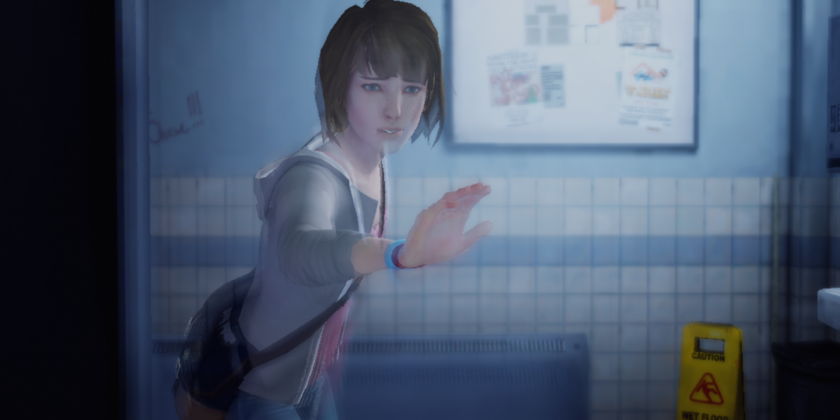
Teens and time-travel
Full disclosure: I adore Life is Strange. Playing through the game on Android marks the third time I’ve experienced its genuinely moving tale of friendship, love, tragedy, destiny, and disaster. I was still an emotional wreck by the end.
However, I want to spend as little time as possible talking about why Life is Strange is so utterly brilliant, instead focusing on whether you should play it on Android over the many other platforms where it’s already available. Let’s touch on the basic premise and gameplay, just in case you’ve yet to be convinced.
In Life is Strange you step into the sneakers of 18-year-old avid photographer Max Caufield, an often irritatingly sincere, but charmingly genteel dork who returns to the fictional coastal town of Arcadia Bay after years away to attend Blackwell Academy boarding school.
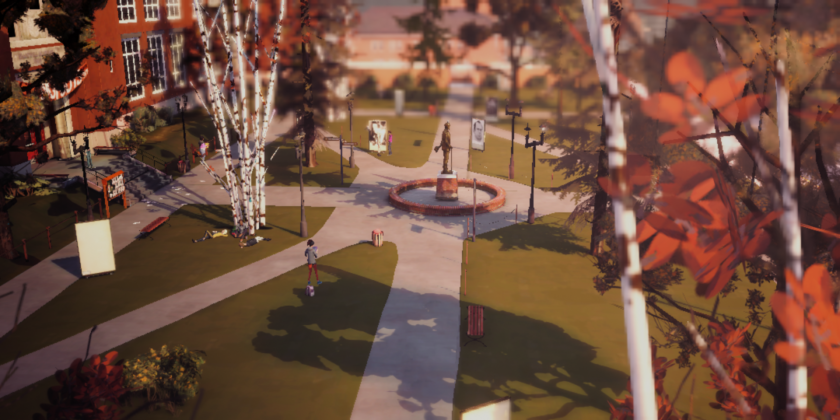
On top of the struggles of navigating Blackwell’s social minefield, capturing quirky snaps for a possibly life-changing photography competition, and trying to get her head around some ominous premonitions, Max’s life gets a lot weirder after she suddenly gains the ability to rewind time and effectively reshape the world around her.
In gameplay terms, this lets you rewind key sequences and decisions to see multiple outcomes, which is unique spin on the usual “this person will remember that” style of conversations in so many adventure games.
Life is Strange is a moving tale of friendship, love, tragedy, destiny, and disaster.
As a whole, Life is Strange retains the light puzzle and detective elements of its genre peers, but rises to the top of the pile through its storytelling and character work.
Before long, Max’s powers thrust her into a whirlwind journey complete with a compelling murder mystery and eerie (un)natural phenomenons. However, the story remains grounded thanks to its central relationship between Max and her estranged BFF, Chloe Price.
Brought to life by Ashly Burch’s incredible voice performance, Chloe is the rebellious, hella cool heart of Life is Strange and the game is at its best in the less action-heavy episodes in which the outcast pair rekindle their lost friendship and generally laze around doing quintessentially teenage stuff.
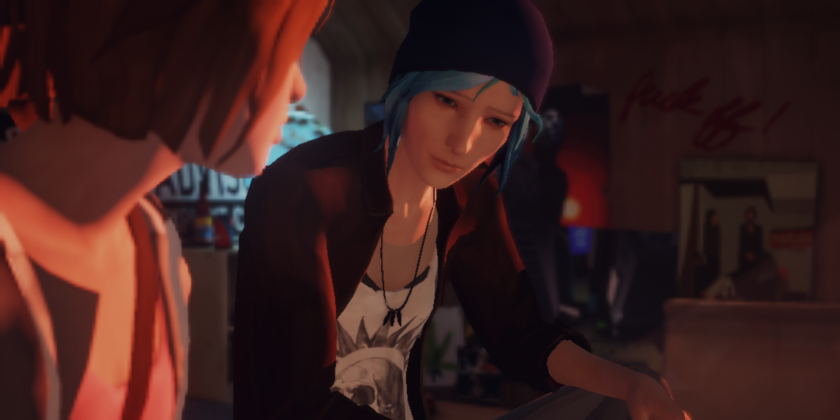
You’ll still get the emotional drama and high stakes you may be looking for, but don’t be surprised if your favorite moments are those spent lying on a bed, staring into space, humming along to a chill Bright Eyes track.
Awkward adaptations
The bulk of Life is Strange is spent walking around, chatting to Max’s school frenemies, interacting with often mundane everyday objects, solving simple logic puzzles, and hitting the rewind button to roll back any social missteps or questionable decisions.
Time shenanigans aside, we’ve already seen these mechanics translate well to touchscreen controls in the numerous excellent point-and-click-style games found on the Play Store, particularly ports of Telltale’s similarly designed adventure games like The Walking Dead, Batman, The Wolf Among Us, and more.
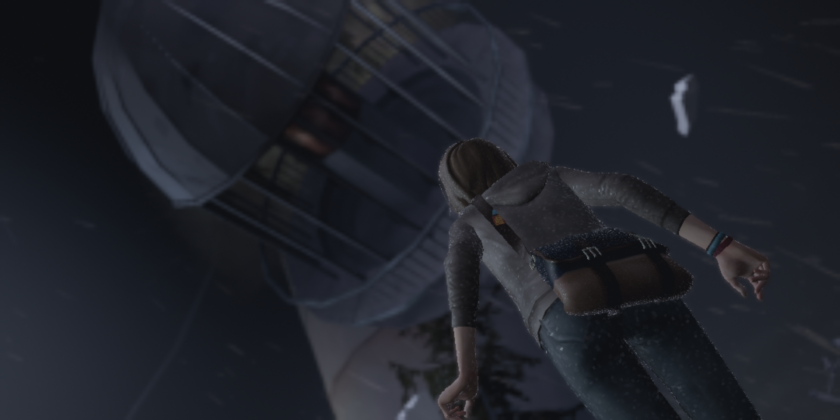
Ignoring optional Bluetooth controller support — undoubtedly the best option if you have a gamepad handy — there are three basic control options in Life is Strange on Android. One is your basic virtual control stick set-up, another ties all movement to screen taps, and the final, least fiddly of the three lets you move Max around by swiping on the left side of the screen and swing the camera by swiping the right side.
All three options come with their own grumbles, but navigating the halls of Blackwell and the sunny climes of Arcadia Bay is mostly intuitive, as long as you don’t mind constantly swiping around with your thumbs.
No matter which you pick, when you want to interact with anything, be it a fellow Blackwell student, a neglected house plant, or a dusty CD player (remember those?), you’ll need to tap on small, contextual icons.
This can be quite fiddly, especially when multiple icons are close together. Sometimes you’ll even need to awkwardly walk Max face first into objects to actually get the touch icons to appear at all.
Navigating around Blackwell Academy and Arcadia Bay is fairly intuitive as long as you don’t mind constantly swiping around with your thumbs.
Other actions, like flicking through Max’s diary and text messages with a few swipes, feel much more natural. The rewind controls lack the deft trigger controls of a gamepad, but the “quick undo” option alows for instant do-overs.
With no real quick time events to speak of, Life is Strange’s slower pace fits a touchscreen experience more so than some of its genre peers. Just don’t expect to get through the entire game, much less an episode, without a little frustration when lining up Max and the camera to bring up the crucial touch icon you need to progress to the next scene.
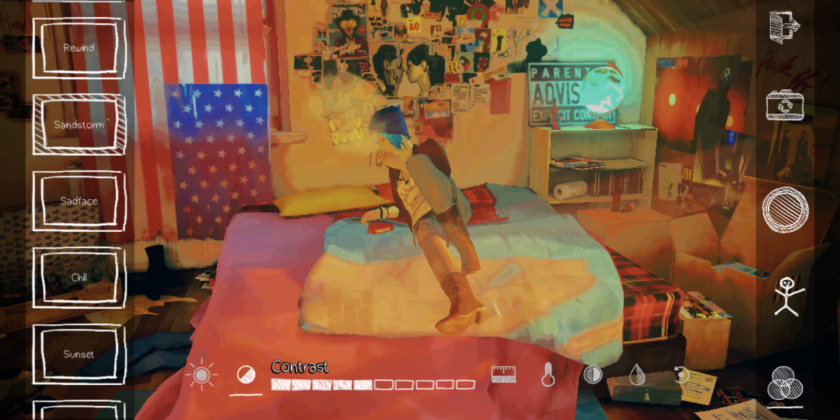
The mobile version’s fun Photo Mode, which debuted with the iOS port, fits in perfectly with the game’s snap-happy protagonist and features plenty of sliders and filters to play with if you fancy letting your own artistic side free (as long as you can ignore the huge Life is Strange watermark on all your shots). You can also switch up Max’s stance and wardrobe to take in-game selfies which, as we all know, is a dumb word for a wonderful photographic tradition, right Mr. Jefferson?
Out of focus
On the visual side, Life is Strange’s pastel-esque art style casts the entire game in a hazy, warm glow that fits the tone perfectly. It also gives the game some wiggle room when rendering characters and environments on less powerful mobile hardware compared to other platforms.
However, there’s still a notable downgrade in lighting and shadow effects throughout. This isn’t as noticeable during daytime scenes, but those set at night look a little washed out and flat. Likewise, there doesn’t appear to be any anti-aliasing going on at all, which means you’ll encounter a lot of jagged edges on NPCs and objects as you explore Arcadia Bay.
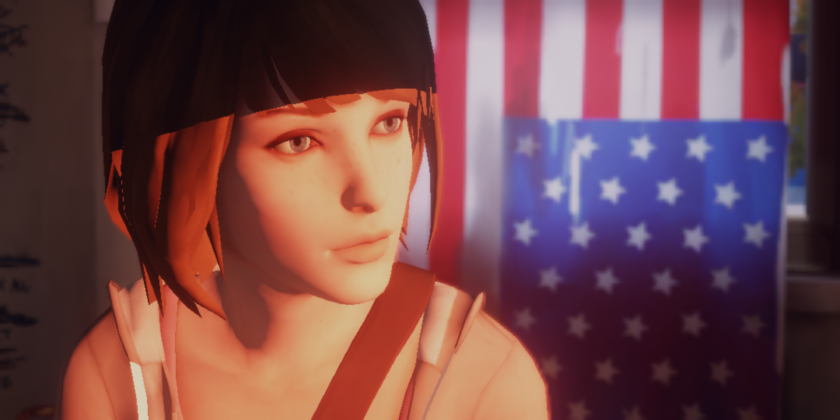
This would be acceptable to some extent if the iOS version suffered from the same issues, but it doesn’t. Check out this comparison shot on Imgur to see the difference.
The visual problems are made worse by the complete lack of any graphics options. I ran the game on a Google Pixel 2 XL which sits well above the minimum recommended specs listed on the Play Store, but I still ran into low resolution textures throughout and more than a few frame rate drops during action-heavy scenes.
Some legacy issues also carry over from previous versions of the game, such as wayward lip syncing and somewhat lengthy load times.
I should also note that if you’re a Chromebook user with access to Android apps you won’t be able to play the game at all. It’s currently incompatible with Play Store-ready Chrome OS devices like the Google Pixelbook.
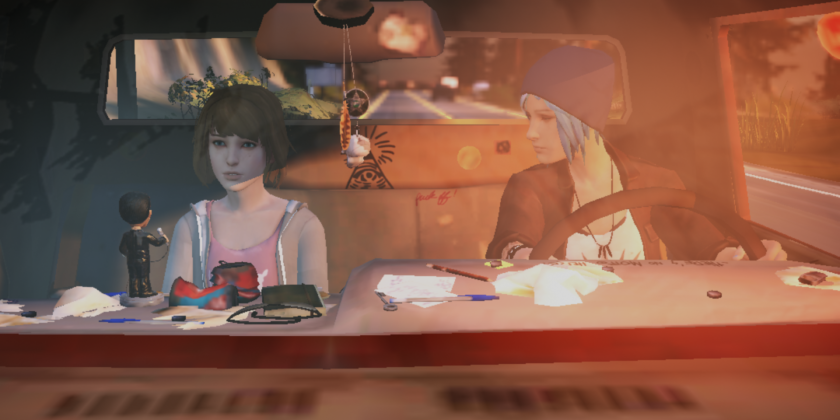
Life is Strange review: Wrapping up
Life is Strange on Android keeps the best elements of Square Enix’s superb game intact. The soundtrack is lush, the visual palette is gorgeous, the voice acting ranks among the best in gaming, and the narrative is as heartwarming (and heartbreaking) as ever.
Yet while the episodic structure lends itself to casual play on the go, Life is Strange is an objectively better game on PC or console, due to the platforms’ huge visual and technical advantages.
However, if the Android version is the only one available to you, or if you’re just looking to play through it all over again, you’d have to be hella stupid to skip over this classic adolescent adventure.
Be the first to comment